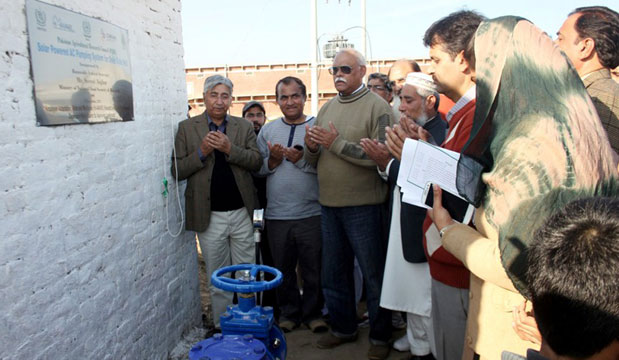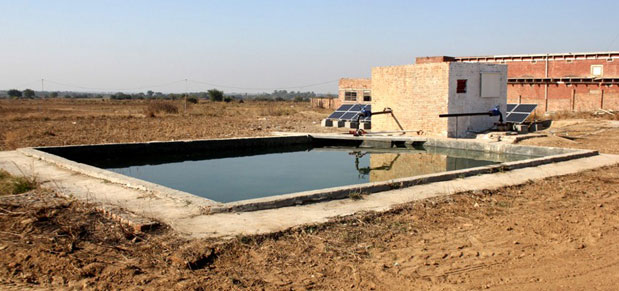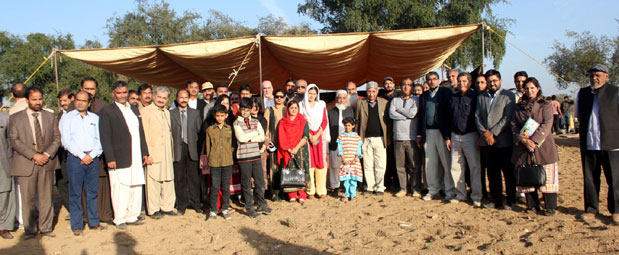 Dr Nadeem Amjad, Chairman of PARC, and Dr Iftikhar Ahmad, Ex-Chairman of PARC, jointly inaugurating the solar-powered AC pumping system for deep tube wells at Talagang
Dr Nadeem Amjad, Chairman of PARC, and Dr Iftikhar Ahmad, Ex-Chairman of PARC, jointly inaugurating the solar-powered AC pumping system for deep tube wells at Talagang
An inauguration ceremony to mark the installation of a solar-powered AC pumping system for tube wells was held in Talagang on December 6 by the Pakistan Agricultural Research Council (PARC).
The system was recently installed at SMF Agro-Farm, Sargodha Road, Talagang, Chackwal, by Climate Change, Alternate Energy & Water Resources Institute (CAEWRI), of the National Agricultural Research Center (NARC)/PARC under the IDRC/CRDI- and DFID-funded MOU project “Himalayan Adaptation, Water and Resilience (HI-AWARE) Research on Glacier and Snow Pack Dependent River Basin for Improving Livelihoods”.
Attending the ceremony were farmers from the Talagang area, professionals of ABAD, OFWM, SAKRI and BARI, representatives from water and solar companies, and scientists from the National Agricultural Research Center (NARC)/PARC.
During the occasion, Dr Nadeem Amjad, Chairman of PARC, and Dr Iftikhar Ahmad, Ex-Chairman of PARC – who jointly inaugurated the ceremony – talked about how the implementation of the solar-powered pumping system, which have an economical edge over existing DC pumping systems, was a landmark achievement for PARC.
They further went on to add that DC solar pumping systems are not economically feasible when larger volumes of water discharge is required from depths of more than 200 ft. They said that it had therefore become exceedingly necessary to design and integrate solar-powered systems with available inverters and AC pumps through state-of-the-art technologies and come up with an affordable solution. They also said that PARC’s engineers had concluded that the way forward would be to integrate solar-powered AC pumps, the ideal economical workable option for deep-water pumping, in highly efficient irrigation systems.
 The solar-powered AC pumping system for deep tube wells in Talagang
The solar-powered AC pumping system for deep tube wells in Talagang
The solar-powered pumping systems should be well received by farmers who depend on deep water sources, said Dr Amjad and Dr Ahmad. According to them, implementing the system should also allow large farming communities in Baluchistan to have access to a supplementary water source for irrigation. In Baluchistan, the majority of tube wells are more than 200 ft deep.
Before he closed, Dr Amjad said that PARC is working for food security and agriculture development in the country by improving existing conventional farming techniques and technologies. And Dr Ahmad, in his address, said he was pleased with the project’s activities and hoped that the project would, through the work done by CAEWRI scientists, come up with even more achievements in improving the efficient use of water in farming.
The Director General of NARC, Dr Muhammad Azeem Khan, said that agricultural scientists in the water sector have been trying their best to solve the farmers’ hardships brought about by water shortage. Towards that end, said Dr Khan, integrating highly efficient irrigation systems with the solar-powered pumps developed and tested by CAEWRI/NARC would contribute in improving the livelihoods of poor farmers.
 Participants at the inaugural ceremony
Participants at the inaugural ceremony
Dr Bernard Cantin, from the IDRC and DFID funded Collaborative Adaptations Research Initiative in Asia and Africa (CARIAA), talked about how adaptation projects would be of help in the region. He said that the focus needed to be on the up-scaling of tested technologies so that a maximum number of poor farmers could benefit from the initiatives to improve their livelihoods and economic conditions.
Malik Nasir Farooq Awan, on behalf of the farmers, talked about how water shortage was creating a lot of problems in the area. He said he had abandoned the sprinkler system due to the attendant high electricity cost of using it for pumping water. He has now opted for PARC’s solar-powered system, and he said that using a system that runs on renewable energy, and thus having no operating cost, would help increase his income.
Dr Muhammad Munir Ahmad, Director of CAEWRI, briefly highlighted the issues that the scientists in the country were working on to help poor farmers overcome hardships and to improve their food security.
Dr Bashir Ahmad, a PSO/PL with HI-AWARE, presented an overview of the project’s activities, along with the output and future impacts of the project.
Engineer Abdul Wahab gave a brief talk about how the AC solar-powered pumping system could be adopted and how the system was technically viable and more affordable than DC solar pumping systems.
